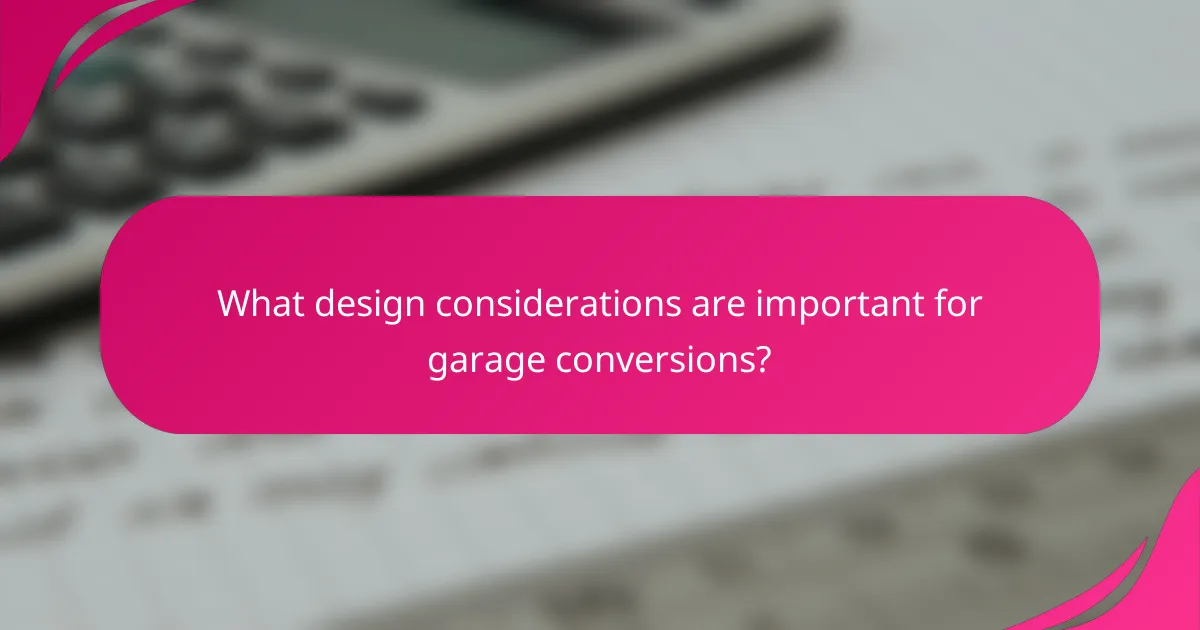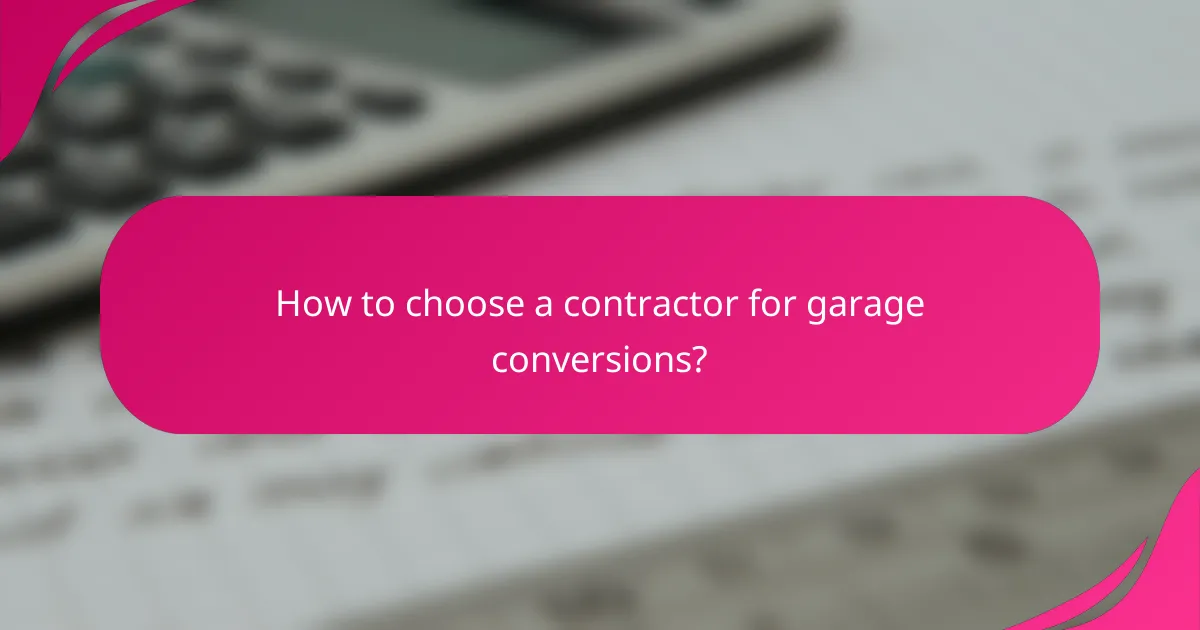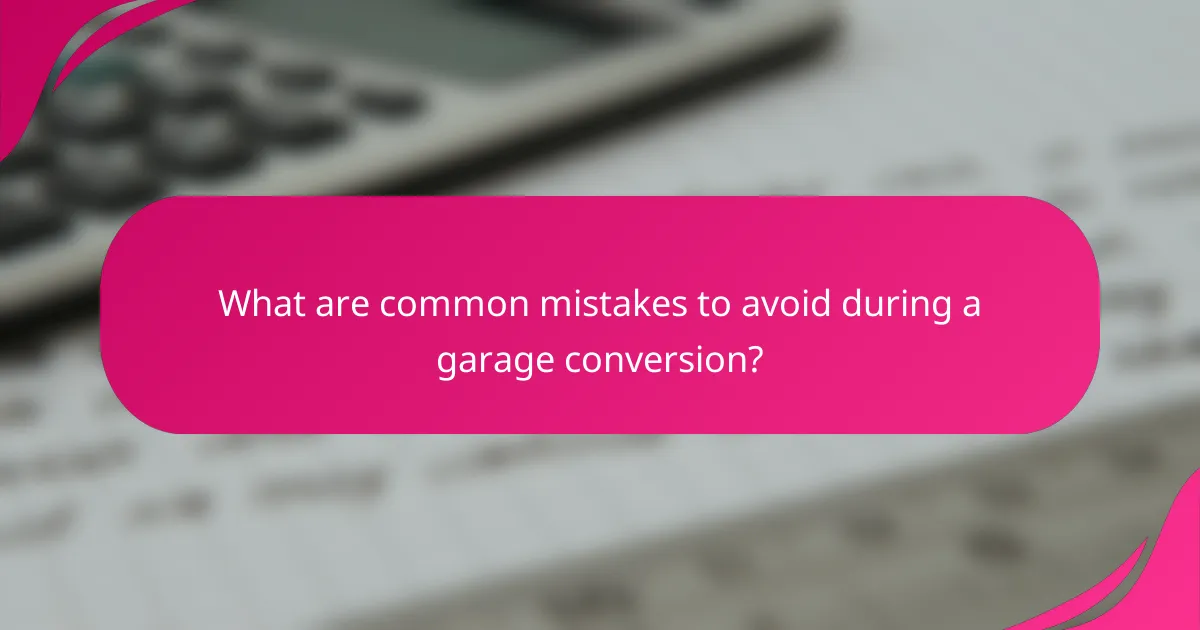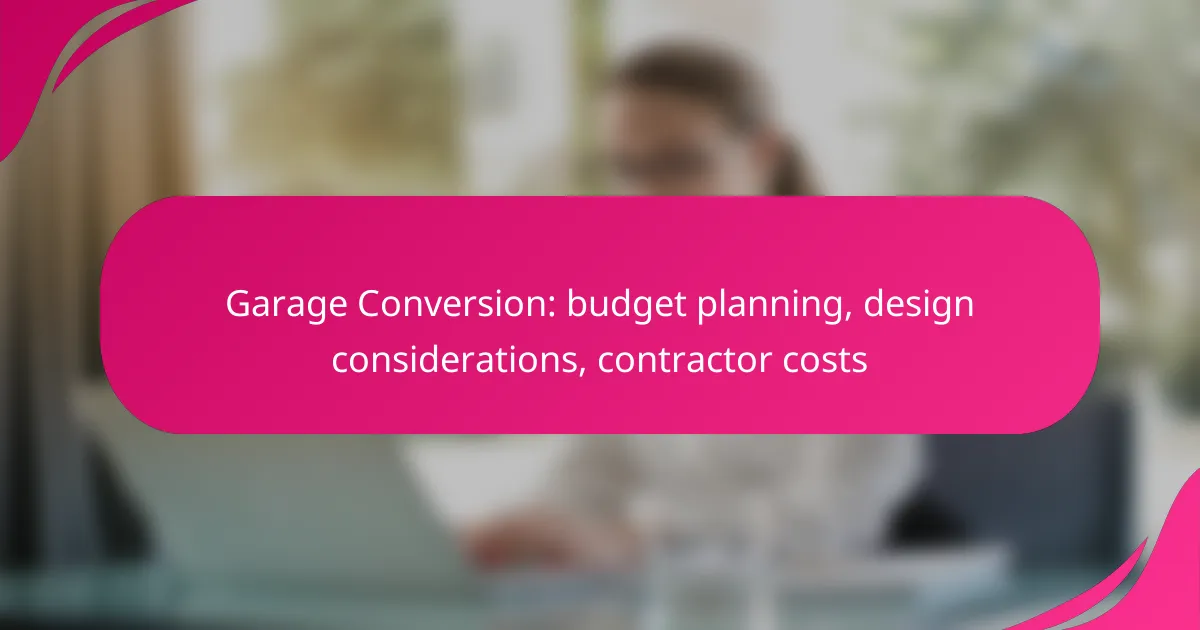Garage Conversion: budget planning, design considerations, contractor costs
Converting a garage can be an excellent way to add functional space to your home, but careful planning is essential. Begin by estimating your budget to cover materials, labor, and permits, while also considering design elements that maximize space and comply with local regulations. Selecting the right contractor is crucial, so prioritize those with experience and a solid reputation in garage conversions to ensure a successful project.

How to budget for a garage conversion in Los Angeles?
To budget for a garage conversion in Los Angeles, start by estimating total costs, including materials, labor, and permits. A well-planned budget will help you avoid unexpected expenses and ensure your project stays on track.
Average costs for garage conversions
The average cost for a garage conversion in Los Angeles typically ranges from $15,000 to $50,000, depending on the complexity and size of the project. Basic conversions may fall on the lower end, while high-end finishes and additional features can push costs higher.
Costs can vary significantly based on the type of conversion, such as turning a garage into a living space, home office, or rental unit. Always obtain multiple quotes from contractors to get a clearer picture of potential expenses.
Factors affecting budget
Additionally, the need for electrical, plumbing, or HVAC systems can add to the budget. Permits and inspections are also necessary in Los Angeles, which can incur additional fees.
Financing options available
Homeowners in Los Angeles have several financing options for garage conversions, including home equity loans, personal loans, and cash-out refinancing. Home equity loans allow you to borrow against your home’s value, often at lower interest rates.
Another option is to consider a renovation loan, which can cover both the purchase and the conversion costs. Always compare interest rates and terms to find the best financing solution for your budget.

What design considerations are important for garage conversions?
When planning a garage conversion, key design considerations include maximizing space, selecting an appropriate style, and ensuring compliance with local building regulations. These factors significantly influence the functionality, aesthetics, and legality of the converted space.
Space utilization strategies
Effective space utilization is crucial for garage conversions. Consider multifunctional furniture, such as sofa beds or foldable tables, to maximize the available area. Open floor plans can create an illusion of more space, while built-in storage solutions help keep the area organized.
Another strategy is to incorporate vertical space by using shelves or cabinets that reach the ceiling. This approach not only provides additional storage but also draws the eye upward, enhancing the overall perception of space.
Design styles for garage conversions
Choosing a design style for your garage conversion can significantly impact its appeal. Popular styles include contemporary, rustic, and industrial, each offering unique aesthetics. For instance, a contemporary design may feature clean lines and minimalistic decor, while a rustic style could incorporate reclaimed wood and vintage elements.
It’s essential to consider how the design will blend with the existing home architecture. Consistency in materials and color schemes can create a cohesive look that enhances the overall property value.
Building regulations and permits
Before starting a garage conversion, check local building regulations and obtain necessary permits. Regulations can vary widely by region, but common requirements include compliance with zoning laws, safety standards, and structural integrity assessments.
Failing to secure the appropriate permits can lead to costly fines or the need to undo completed work. It’s advisable to consult with local authorities or a professional contractor to ensure all legal requirements are met before proceeding with the conversion.

How to choose a contractor for garage conversions?
Choosing a contractor for garage conversions involves evaluating their experience, reputation, and pricing. Start by researching local professionals with a proven track record in similar projects to ensure quality and reliability.
Top-rated contractors in Los Angeles
In Los Angeles, several contractors specialize in garage conversions, known for their quality work and customer satisfaction. Look for companies with strong online reviews and ratings, such as those listed on platforms like Yelp or Angie’s List.
Some top-rated contractors include Garage Conversion Experts and LA Garage Builders. These firms often showcase completed projects and client testimonials, providing insight into their capabilities.
Questions to ask potential contractors
When interviewing potential contractors, ask about their experience with garage conversions specifically. Inquire about the number of similar projects they have completed and request references from past clients.
Additionally, discuss their licensing and insurance status to ensure compliance with local regulations. Questions about timelines, project management, and warranty offerings can also help gauge their professionalism and reliability.
Evaluating contractor quotes
When evaluating contractor quotes, compare not only the total cost but also the breakdown of materials and labor. A detailed quote should outline each component, allowing for better transparency and understanding of the project scope.
Be cautious of quotes that are significantly lower than others, as they may indicate subpar materials or rushed work. Aim for a balance between cost and quality, and consider the contractor’s reputation and past work as part of your decision-making process.

What are the typical costs associated with garage conversion contractors?
The costs for hiring garage conversion contractors can vary significantly based on location, project scope, and contractor experience. On average, homeowners can expect to spend several thousand to tens of thousands of dollars for a complete garage conversion, depending on the complexity and materials used.
Labor costs breakdown
Labor costs typically account for a substantial portion of the total expenses in a garage conversion. Depending on the region, hourly rates for contractors can range from $50 to $150 or more. Complex tasks such as electrical work or plumbing may require specialized contractors, which can increase labor costs further.
It’s advisable to obtain multiple quotes from different contractors to ensure competitive pricing. Be sure to clarify what is included in the labor costs, such as cleanup and project management, to avoid surprises later.
Material costs for garage conversions
Material costs can vary widely based on the quality and type of materials chosen for the conversion. Basic materials like drywall and insulation may cost a few dollars per square foot, while high-end finishes can significantly increase the budget. On average, homeowners might spend anywhere from $5,000 to $15,000 on materials alone.
Consider creating a detailed list of required materials and researching prices at local suppliers. This can help in making informed decisions and potentially saving money through bulk purchases or discounts.
Hidden costs to consider
Hidden costs in garage conversions can catch homeowners off guard. These may include permits, inspections, and potential structural modifications that arise during the project. Depending on local regulations, permit fees can range from a few hundred to over a thousand dollars.
Additionally, homeowners should budget for unexpected expenses, such as repairs to existing structures or systems. Setting aside an additional 10-20% of the total budget for contingencies is a prudent strategy to cover these unforeseen costs.

What are the benefits of converting a garage?
Converting a garage offers several advantages, including enhanced property value, increased living space, and the potential for rental income. These benefits can significantly impact your home’s functionality and financial return.
Increased property value
A garage conversion can substantially boost your property’s market value. Homebuyers often seek additional usable space, and a well-executed conversion can make your home more appealing in a competitive market.
According to real estate experts, a garage conversion can increase property value by a range of 10-20%. However, the exact increase will depend on local market conditions and the quality of the conversion.
Additional living space
Converting a garage provides extra living space that can be used for various purposes, such as a home office, guest room, or recreational area. This added space enhances your home’s versatility and can improve your overall quality of life.
When planning the conversion, consider how you want to use the space. This will guide your design choices and help you maximize functionality. For example, if you need a home office, ensure there is adequate lighting and electrical outlets.
Potential rental income
A garage conversion can create a separate living unit that may be rented out, generating additional income. This is particularly beneficial in urban areas where rental demand is high.
Before renting, check local regulations regarding rental properties and ensure your conversion meets safety and zoning standards. Depending on your location, you may need to obtain permits or comply with specific building codes.

What are common mistakes to avoid during a garage conversion?
Common mistakes during a garage conversion include underestimating costs and neglecting local regulations. Avoiding these pitfalls can save time and money, ensuring a smoother renovation process.
Underestimating costs
Many homeowners fail to accurately estimate the total costs associated with converting a garage. Expenses can quickly add up, including materials, labor, permits, and unexpected repairs. It’s crucial to create a detailed budget that includes a buffer for unforeseen costs, typically around 10-20% of the total estimate.
Consider breaking down the budget into categories such as construction, electrical work, plumbing, and finishing touches. This approach helps in identifying potential overspending areas early on. For example, while basic renovations might start in the low thousands of USD, high-end finishes can push costs significantly higher.
Neglecting local regulations
Ignoring local regulations can lead to costly fines and project delays. Before starting a garage conversion, check with local authorities about zoning laws, building codes, and permit requirements. Each area may have specific guidelines that dictate how a garage can be converted, including minimum square footage and safety standards.
It’s advisable to consult with a local contractor or architect familiar with the regulations in your area. They can help ensure compliance and avoid potential legal issues. Additionally, obtaining necessary permits before beginning work can prevent interruptions and additional expenses later in the project.

Leave a Reply